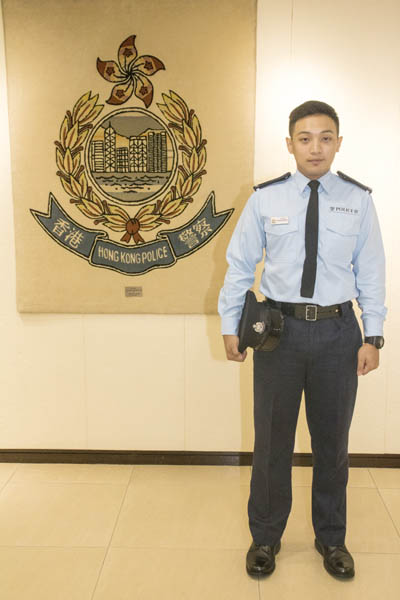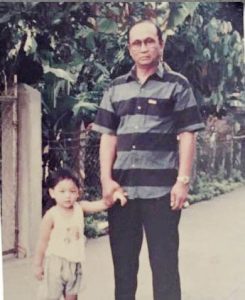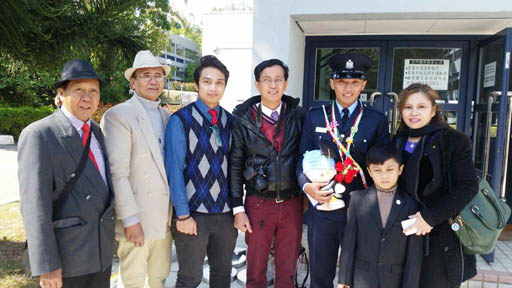 Hong Kong has long been a favorite travel destination for many Filipinos. In 2016 alone, 791,171 Filipino tourists visited Hong Kong for shopping bargains, gourmet treats and Disneyland. The city is also a popular destination for overseas Filipino workers. They comprise Hong Kong’s largest migrant worker community with a population of 184,081. So it makes sense for the Hong Kong police force to have a Filipino officer to deal with matters involving Pinoys. In its 173 years of history, four Filipino officers have joined the ranks of the Hong Kong police. But since the 1997 handover, no Filipino has been hired by the Hong Kong police. The reason? Proficiency in Cantonese language was made a prime requisite for civil service positions.
Hong Kong has long been a favorite travel destination for many Filipinos. In 2016 alone, 791,171 Filipino tourists visited Hong Kong for shopping bargains, gourmet treats and Disneyland. The city is also a popular destination for overseas Filipino workers. They comprise Hong Kong’s largest migrant worker community with a population of 184,081. So it makes sense for the Hong Kong police force to have a Filipino officer to deal with matters involving Pinoys. In its 173 years of history, four Filipino officers have joined the ranks of the Hong Kong police. But since the 1997 handover, no Filipino has been hired by the Hong Kong police. The reason? Proficiency in Cantonese language was made a prime requisite for civil service positions.
Such was the case until 2016, when Dean Jason Olino Escuro entered the Hong Kong police force with a rank of police constable.
Escuro was born in Nabua, Bicol in 1994. His family moved to Hong Kong when he was 2 years old, thanks to his maternal grandfather, Edmundo Olino, who had worked in Hong Kong as a musician since the 1980s.
Escuro’s father, Dennis Jason, worked in the hotel industry, while his mother, Susan, worked as a singer. He has two other siblings, an older brother, Jash Kevin Jay, and younger brother, Deeon. As for his marital status, he still checks the box that says single in forms and surveys.
Escuro’s parents enrolled him at the Po Lin Monastery Kindergarten when he was three, and he transferred to the Bui O Primary School at six. As he was one of only three Pinoys in the school, it was the school’s principal who gave him a Chinese name (易甸基).
Escuro, an average student, began learning communicating in English, Cantonese and Mandarin in primary school. But his family maintained their Philippine links by speaking Tagalog and Bicolano at home. During school vacation, the whole family would travel back to Bicol to visit relatives.
He enjoyed outdoor activities such as hiking and sports, which darkened his complexion. As a result, he was frequently teased about his dark skin by his schoolmates. Though it was an unpleasant experience, it helped him develop an understanding of and compassion for those in need and instilled a desire to help the helpless.
Entering the Ling Liang Church Ewun Secondary School proved a turning point in his young life. It was there he joined Junior Police Call. Set up in 1974 by the Hong Kong Police’s public relations department as a community outreach program, volunteer police officers would keep kids out of trouble by engaging them in sports activities and performing community services.
These activities help equip the kids to become future leaders of Hong Kong’s community. Escuro loved the group as it gave him the sense of belonging and purpose that he yearned for.

His experience made him decide to join the Hong Kong police force. He believed becoming a police officer would serve as an inspiration to other Filipino migrants: that it was possible for Pinoys to enter the Hong Kong civil service. His family was supportive of his decision, but there was the issue of his Chinese language skills. While he could speak Cantonese, Escuro wasn’t sure if his reading and writing skills would enable him to pass the standard set by the government.
To overcome that barrier, Escuro joined Project Gemstone in 2013. It was an offshoot program launched in the same year by the Yau Tsim Police District and Junior Police Call to help non-ethnic Chinese (NEC) youth like him improve their Chinese language proficiency, to better integrate and boost their confidence in joining the Hong Kong civil service.
Project Gemstone was conceived when it observed that while there were many Hong Kong ethnic minority youths qualified to join the police force, they were unable to do so due to their lack of Cantonese and Mandarin communication skills.
Police Sergeant Hung Ka Wai, a volunteer of the project, says this is because the NECs have few opportunities to practice. He says that when the kids are at school they prefer to hang out with other kids from the same ethnic background.
At home, they converse in their respective mother tongues. Such a lack of Chinese language skills hinders their chances of finding a white collar job or work in Hong Kong’s civil service.
Project Gemstone is open to all youth from Hong Kong’s ethnic minority communities aged 16 to 25 years old. To make it accessible as widely as possible, it is offered free of charge.
As in Junior Police Call, the instructors are mostly volunteer police officers. Volunteers would engage the students in fun physical activities such as hiking, paintball and sports. The first two hours of their weekly meeting is devoted to language training, taught by a qualified professional. The instructors would tutor the students to speak better Chinese through experience-based learning and immersion in Hong Kong’s culture.

When Hung first met Escuro, he considered his Chinese language skills as “Okay-lah.” He thought that the gap between Escuro’s Chinese language skills and Chinese kids his age was not that big. But even so, Escuro stayed with Project Gemstone for two years to improve his Chinese. He then enrolled in the Hong Kong police college in August 2015 for six months of training. By February 2016, the moment he has been waiting for arrived. He was sworn in as part of the Hong Kong police force with the rank of police constable. (This is the equivalent to our ranking of Police Officer 1 in the Philippine National Police.) He considers this as being the proudest achievement of his life so far.
As police constable, his first assignment was doing street patrol and responding to 999 emergency calls. Here, he was exposed to all kinds of cases including burglary, domestic abuse and attempted suicide.
Escuro observed that theft seemed to be the most common crime that Filipinos are often involved in or are accused of. He added, however, that criminality levels in Hong Kong’s Filipino community is not higher than those of other ethnic minorities or the Chinese community itself.
As expected, Escuro is the one the police would summon on matters relating to Filipino domestic helpers. One such case was when he was called to mediate with the people in the Tsuen Wan district.
Every October until December, the sidewalks and streets around the district’s Lik Sang Plaza are blocked by vendors and domestic helpers. Many of the Pinays would even use the sidewalk to pack their balikbayan boxes or care packages. As expected, the residents in the area are not happy and urged the police to do something about the street blockage. Escuro was able to mediate a solution as he is able to communicate with all the parties involved.
When asked if he sometimes feels his work divides him from the Pinoy community, Escuro says he doesn’t feel like that at all. In fact, he views himself as a bridge between the Filipinos and the Hong Kong law enforcement agency.
There are times that he would also respond to calls involving non-Filipinos, as he understands heavily accented English better than his Chinese colleagues. In a China Daily interview, he cited one case where he was able to help a panicking Indian mother locate her missing daughter.
So far, Escuro has earned a good reputation from his immediate superiors and teammates. One of his superiors, Woman Senior Inspector of Police Helen Ling, finds that Escuro is “a young and energetic officer who has a serious attitude towards his career and is growing on the right path.”
Oftentimes when the media approach the Hong Kong police to do a story on Project Gemstone, Escuro is the one presented to the media as a success story for the project.
Escuro is not patrolling the streets of Hong Kong at present. He has been reassigned to the Report Room where he answers calls and queries made to the police 999 emergency number. But he has other plans for the long term. Having been equipped by the Project Gemstone, he feels empowered to help other kids from Hong Kong ethnic minority community. Hopefully one day soon, we can see his lasting and worthwhile contribution to Hong Kong’s police and society.
